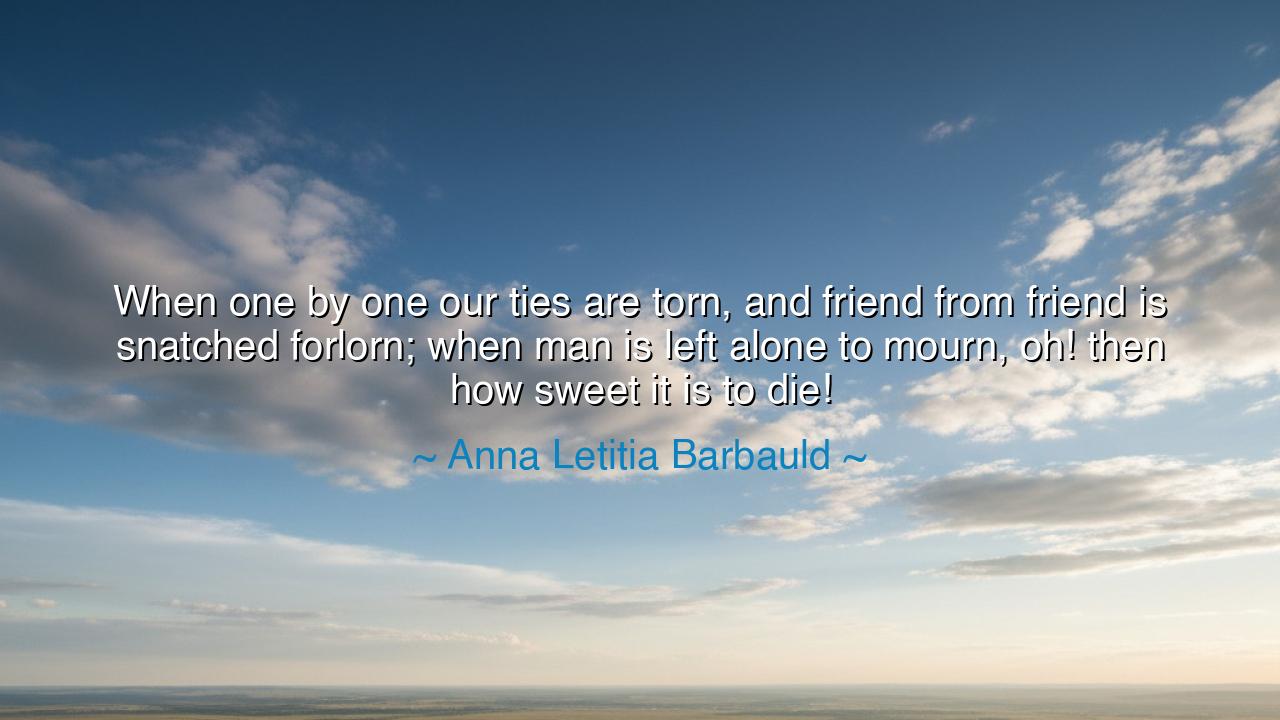
When one by one our ties are torn, and friend from friend is
When one by one our ties are torn, and friend from friend is snatched forlorn; when man is left alone to mourn, oh! then how sweet it is to die!






When the poet Anna Letitia Barbauld wrote, “When one by one our ties are torn, and friend from friend is snatched forlorn; when man is left alone to mourn, oh! then how sweet it is to die!”, she spoke not from despair, but from the serene wisdom of one who had walked far upon life’s road. These lines, tender yet powerful, emerge from her poem Life, composed in the quiet evening of her years. They are the words of a spirit who has loved deeply, suffered loss, and learned that even death, so feared by the living, can become a gentle release — not an ending, but a homecoming. In her voice we hear not the cry of defeat, but the sigh of acceptance — the calm after the storm of human grief.
Barbauld lived in the eighteenth century, an age of intellect and sentiment, when poets sought to bridge the world of reason and the world of feeling. She was a woman of letters, of faith, and of luminous thought, who believed that life’s beauty is woven with sorrow. Her words reflect the wisdom of age — that as we grow older, the ties that bind us to this world are slowly undone. One by one, we lose those we love: a mother’s smile fades, a friend’s laughter falls silent, a beloved companion is carried away by time. Each loss tears at the fabric of our hearts, until we stand alone upon the shore of life, gazing toward the vast and final sea. In that hour, she says, even death becomes sweet, for it promises reunion, rest, and peace beyond the weariness of mourning.
The ancients knew this truth as well. The Greek sage Socrates, condemned to die, spoke calmly to his weeping friends. “Shall we not think,” he asked, “that death is the journey of the soul to a better place?” For the philosopher, death was not an abyss, but a doorway — the soul’s passage into the realm of pure understanding, where all separations end. Like Barbauld, he recognized that when life has stripped us of all illusion, when love and loss have hollowed out the heart, the soul begins to yearn for its eternal home. What we call the end is but the soul’s return to the divine source from which it came.
And yet, Barbauld’s words are not a rejection of life. They are, in truth, an exaltation of it. To say that it is “sweet to die” is also to acknowledge that it was once sweet to live — to love, to share, to hope. Her poem honors both: the glory of human connection, and the holiness of letting go. She teaches that the soul’s journey is a circle — it begins in wonder, grows through attachment, and finds peace in release. Life’s meaning is not lost in death; it is completed there. The sweetness she speaks of is not the taste of escape, but the quiet joy of fulfillment — the weary traveler resting at last beneath the stars.
Consider the life of Michelangelo, who in his old age turned his genius away from grandeur and toward simplicity. Once he sculpted the heroic David, radiant with youthful power; later, he carved the Pietà Rondanini, an unfinished work of raw tenderness — the Virgin cradling the dying Christ, both figures dissolving into one another. His chisel faltered, not from weakness, but from revelation: that love and loss are one, and that in surrender there is completion. So too in Barbauld’s verse, the soul that has loved deeply must also learn to release deeply. In this surrender, there is no despair — only the quiet harmony of a life fully lived.
Her words also remind us that grief is the teacher of compassion. When we mourn, we awaken to the shared suffering of humanity. Every tear shed for a loved one connects us to the tears of all who have ever lived. And in this understanding, death itself loses its sting. It becomes not an enemy, but a messenger — a reminder that love transcends the grave, that nothing truly beautiful is ever lost. When the last tie is broken, when the heart has given all, what remains is not emptiness but light — the still radiance of the eternal.
Thus, let this be the lesson of Barbauld’s wisdom: Do not fear the loneliness of age, nor the silence that follows loss. They are but the soul’s preparation for peace. Cherish your friendships while they bloom, for they are the music of your days; but when their song fades, do not cling in despair. Let memory become your comfort and faith your companion. For when you have loved well, death will not come as a thief, but as a friend who takes your hand and leads you home.
So remember, children of the living world: to die sweetly, one must first live deeply. Love with open hands, forgive with a full heart, and walk through each season without fear. For when the final ties are torn and you stand alone before eternity, you will not tremble. You will smile — for you will know, as Anna Letitia Barbauld knew, that life’s end is but its highest peace, and that beyond sorrow waits the infinite tenderness of rest.






AAdministratorAdministrator
Welcome, honored guests. Please leave a comment, we will respond soon